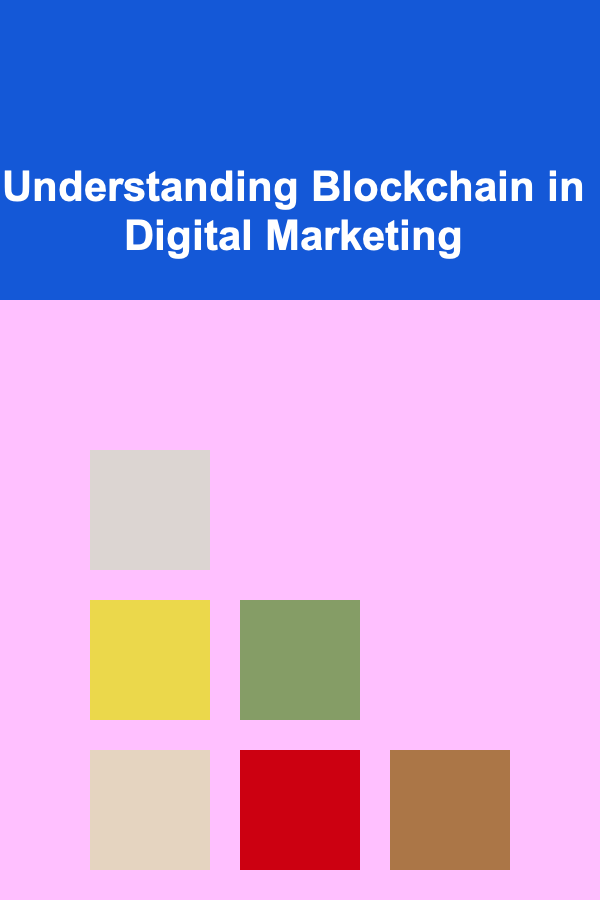
Understanding Blockchain in Digital Marketing
ebook include PDF & Audio bundle (Micro Guide)
$12.99$5.99
Limited Time Offer! Order within the next:

Introduction: Beyond Cryptocurrency - The Marketing Potential of Blockchain
Blockchain technology, initially synonymous with cryptocurrencies like Bitcoin, has far-reaching implications beyond the realm of finance. Its core characteristics -- decentralization, transparency, and immutability -- present a paradigm shift with significant potential to revolutionize various industries, including digital marketing. This article delves into the intricacies of blockchain technology and explores its profound impact on digital marketing strategies, exploring how it can address existing challenges and unlock new opportunities.
The digital marketing landscape is fraught with issues like ad fraud, data privacy concerns, and a lack of transparency in advertising campaigns. Consumers are increasingly skeptical of traditional marketing methods, demanding greater control over their data and a more authentic brand experience. Blockchain offers a compelling solution to these problems by providing a secure, transparent, and decentralized infrastructure that empowers both marketers and consumers. By leveraging the power of blockchain, marketers can build trust, improve campaign efficiency, and create more personalized and engaging customer experiences.
Demystifying Blockchain: Core Concepts and Principles
To understand the potential of blockchain in digital marketing, it's essential to grasp its fundamental concepts:
- Decentralization: Unlike traditional centralized systems where data is stored in a single location controlled by a central authority, blockchain distributes data across a network of computers. This eliminates the single point of failure and reduces the risk of data manipulation or censorship. In the context of marketing, this means that data is not controlled by a single platform (e.g., a social media giant) but rather by a distributed network, promoting greater transparency and user control.
- Immutability: Once data is recorded on a blockchain, it cannot be altered or deleted. Each block of data is linked to the previous block using cryptographic hashing, creating a tamper-proof record. This immutability is crucial for ensuring the integrity of marketing data and preventing fraud.
- Transparency: All transactions on a public blockchain are publicly visible and auditable. While the identities of participants may be pseudonymous, the transaction history is transparent. This transparency allows for greater accountability and trust in marketing campaigns. However, it is crucial to consider privacy implications and implement appropriate safeguards.
- Cryptography: Blockchain relies heavily on cryptographic techniques to secure data and verify transactions. This includes hashing algorithms and digital signatures, ensuring that data is protected from unauthorized access and modification.
- Consensus Mechanisms: To ensure that all participants in the network agree on the validity of transactions, blockchain employs consensus mechanisms. Examples include Proof-of-Work (PoW) and Proof-of-Stake (PoS). These mechanisms prevent malicious actors from manipulating the blockchain and ensure the integrity of the data.
- Smart Contracts: Smart contracts are self-executing agreements written in code and stored on the blockchain. They automatically execute when pre-defined conditions are met, eliminating the need for intermediaries and reducing the risk of disputes. In digital marketing, smart contracts can automate various processes, such as rewarding users for engaging with content or managing affiliate marketing programs.
Blockchain's Impact on Key Digital Marketing Areas
Blockchain's unique properties can address several critical challenges and create new opportunities across various digital marketing domains:
1. Combating Ad Fraud
Ad fraud is a pervasive issue in digital advertising, costing marketers billions of dollars annually. Bots and fake accounts generate fraudulent clicks and impressions, inflating campaign metrics and wasting advertising budgets. Blockchain can provide a transparent and auditable record of ad impressions, clicks, and conversions, making it difficult for fraudsters to manipulate the data. By tracking every interaction on a distributed ledger, blockchain can verify the authenticity of ad impressions and eliminate fraudulent activities. Solutions utilizing blockchain for ad verification ensure that marketers are only paying for genuine engagement.
Example: Platforms like AdChain are using blockchain to create a whitelist of legitimate publishers. Advertisers can then use this whitelist to ensure that their ads are only displayed on trusted websites, reducing the risk of ad fraud.
2. Enhancing Data Privacy and Security
Consumers are increasingly concerned about their data privacy, especially in light of data breaches and unauthorized data collection practices. GDPR and other regulations emphasize the importance of data protection and user consent. Blockchain can empower users with greater control over their data by enabling them to securely manage and share their information. Self-sovereign identity solutions built on blockchain allow users to own and control their digital identities, deciding which data to share with marketers and when. This promotes transparency and builds trust between brands and consumers. Blockchain based marketing solutions also allow for data to be anonymized while still being useful for analysis, providing a good balance between privacy and utility.
Example: Projects focused on self-sovereign identity are developing decentralized identity solutions that allow users to control their personal data and selectively share it with marketers, ensuring compliance with privacy regulations.
3. Improving Transparency in Supply Chains
In the digital marketing context, supply chains refer to the complex network of intermediaries involved in delivering advertising campaigns, from publishers to ad networks to demand-side platforms (DSPs). Blockchain can provide end-to-end visibility into the entire advertising supply chain, ensuring that marketers can track the flow of funds and verify the authenticity of impressions and clicks. This transparency reduces the risk of hidden fees and fraudulent activities, empowering marketers to optimize their campaigns and maximize their ROI. This transparency also makes it easier to identify and address inefficiencies within the supply chain.
Example: Blockchain-based advertising platforms can track the entire journey of an ad impression, from its origin to its final destination, providing marketers with a clear and transparent view of the supply chain.
4. Fostering Customer Loyalty and Engagement
Blockchain can be used to create innovative loyalty programs that reward customers for engaging with brands and providing valuable data. Cryptocurrencies or tokens can be used to incentivize customer loyalty and create a more engaging experience. These tokens can be redeemed for discounts, exclusive content, or other rewards. By leveraging blockchain, brands can create more personalized and rewarding experiences for their customers, fostering stronger relationships and increasing customer lifetime value. Furthermore, blockchain can facilitate the creation of decentralized autonomous organizations (DAOs) around brands, allowing customers to participate in decision-making processes and contribute to the brand's development.
Example: A brand could issue its own cryptocurrency that customers can earn by making purchases, referring friends, or engaging with content. These tokens can then be used to redeem for exclusive products or services.
5. Revolutionizing Content Creation and Distribution
Blockchain can empower content creators by providing them with greater control over their work and ensuring that they are fairly compensated for their efforts. Decentralized content platforms allow creators to directly connect with their audience, eliminating the need for intermediaries like social media platforms or content distribution networks. Smart contracts can automatically distribute royalties and payments to creators, ensuring that they receive a fair share of the revenue generated by their content. This can lead to a more equitable and sustainable ecosystem for content creation and distribution.
Example: A music streaming platform built on blockchain could use smart contracts to automatically distribute royalties to artists based on the number of streams their songs receive. This ensures that artists are fairly compensated for their work and eliminates the need for intermediaries to collect and distribute royalties.
6. Streamlining Affiliate Marketing Programs
Affiliate marketing programs can be complex and prone to fraud. Blockchain can streamline these programs by providing a transparent and auditable record of affiliate referrals and conversions. Smart contracts can automatically track affiliate commissions and ensure that affiliates are paid accurately and on time. This reduces the risk of disputes and improves the efficiency of affiliate marketing programs. Furthermore, blockchain can facilitate the creation of decentralized affiliate networks, allowing publishers and advertisers to connect directly without the need for intermediaries.
Example: A blockchain-based affiliate marketing platform could use smart contracts to automatically track affiliate referrals and conversions, ensuring that affiliates are paid accurately and on time. This eliminates the need for manual tracking and reduces the risk of disputes.
7. Facilitating Micro-Influencer Marketing
Micro-influencers, with their smaller but highly engaged audiences, are increasingly valuable in digital marketing. However, managing relationships with numerous micro-influencers and tracking their performance can be challenging. Blockchain can streamline this process by providing a platform for connecting brands with micro-influencers and tracking their performance in a transparent and auditable manner. Smart contracts can automate payments to influencers based on pre-defined metrics, ensuring that they are fairly compensated for their efforts. This makes it easier for brands to collaborate with micro-influencers and leverage their influence to reach target audiences.
Example: A blockchain-based platform connecting brands and micro-influencers could use smart contracts to automate payments based on engagement metrics (likes, shares, comments) received on influencer posts. This ensures fair compensation and incentivizes high-quality content creation.
Challenges and Considerations
While blockchain offers numerous benefits for digital marketing, it's important to acknowledge the challenges and considerations associated with its adoption:
- Scalability: Some blockchain networks, like Bitcoin, have limited transaction processing capacity, which can pose a challenge for high-volume marketing applications. However, newer blockchain technologies and scaling solutions are addressing this issue.
- Regulatory Uncertainty: The regulatory landscape surrounding blockchain technology is still evolving, and businesses need to stay informed about relevant regulations to ensure compliance.
- Complexity: Implementing blockchain solutions can be complex and require specialized expertise. Businesses may need to invest in training or hire blockchain developers to build and maintain these solutions.
- User Adoption: Widespread adoption of blockchain-based marketing solutions requires educating consumers and businesses about the technology and its benefits. Overcoming user resistance and promoting adoption are crucial for realizing the full potential of blockchain.
- Privacy Concerns: While blockchain can enhance data privacy, it's important to carefully consider the privacy implications of specific implementations. Data anonymization techniques and privacy-enhancing technologies may be necessary to ensure compliance with privacy regulations.
- Interoperability: Different blockchain networks may not be compatible with each other, which can limit the ability to share data and interact across different platforms. Developing interoperability standards is crucial for promoting the widespread adoption of blockchain.
- Environmental Impact: Some blockchain consensus mechanisms, like Proof-of-Work, are energy-intensive and have a significant environmental impact. Businesses should consider using more energy-efficient consensus mechanisms, such as Proof-of-Stake, to minimize their environmental footprint.
Real-World Examples and Case Studies
While the application of blockchain in digital marketing is still in its early stages, several companies are already exploring and implementing innovative solutions:
- Brave Browser: Brave Browser is a web browser that blocks ads and trackers and allows users to earn Basic Attention Tokens (BAT) for viewing privacy-respecting ads. Users can then use these tokens to support their favorite content creators. This creates a more equitable and transparent advertising ecosystem.
- AdChain: AdChain is a blockchain-based platform that creates a whitelist of legitimate publishers, helping advertisers avoid ad fraud and ensure that their ads are displayed on trusted websites.
- MetaX: MetaX is a company that provides blockchain-based solutions for the advertising industry, including ad verification, supply chain transparency, and fraud prevention.
- IBM Blockchain for Advertising: IBM is developing blockchain solutions for the advertising industry to improve transparency, reduce fraud, and enhance data privacy.
These examples demonstrate the potential of blockchain to disrupt the digital marketing landscape and create new opportunities for businesses and consumers.
Future Trends and Predictions
The integration of blockchain into digital marketing is expected to accelerate in the coming years, driven by increasing concerns about ad fraud, data privacy, and transparency. Here are some key trends and predictions:
- Increased adoption of decentralized marketing platforms: More brands and consumers will adopt decentralized marketing platforms that leverage blockchain to improve transparency, reduce fraud, and enhance data privacy.
- Growth of blockchain-based loyalty programs: Blockchain-based loyalty programs will become more prevalent, rewarding customers for engaging with brands and providing valuable data.
- Development of more sophisticated smart contract applications: Smart contracts will be used to automate a wider range of marketing processes, such as ad buying, affiliate marketing, and content distribution.
- Integration of blockchain with other emerging technologies: Blockchain will be integrated with other emerging technologies, such as artificial intelligence (AI) and the Internet of Things (IoT), to create even more powerful and innovative marketing solutions.
- Increased focus on data privacy and compliance: Businesses will prioritize data privacy and compliance with regulations like GDPR, leveraging blockchain to protect user data and build trust.
- Greater emphasis on transparency and accountability: Marketers will be held to higher standards of transparency and accountability, with blockchain providing the tools to track and verify the performance of their campaigns.
Getting Started with Blockchain in Digital Marketing
For marketers looking to explore the potential of blockchain, here are some practical steps to get started:
- Educate yourself: Gain a thorough understanding of blockchain technology and its potential applications in digital marketing.
- Identify your pain points: Identify the specific challenges you face in your marketing campaigns, such as ad fraud, data privacy concerns, or lack of transparency.
- Research blockchain solutions: Explore different blockchain-based solutions that address your specific pain points.
- Start small: Begin with a pilot project to test the feasibility and effectiveness of a blockchain solution.
- Partner with experts: Collaborate with blockchain developers and marketing experts to build and implement blockchain solutions.
- Stay informed: Keep up-to-date with the latest developments in blockchain technology and its applications in digital marketing.
- Focus on User Experience: Blockchain solutions should be user-friendly and provide a seamless experience for both marketers and consumers.
Conclusion: Embracing the Future of Marketing with Blockchain
Blockchain technology has the potential to fundamentally transform the digital marketing landscape, addressing critical challenges and creating new opportunities for businesses and consumers. By embracing decentralization, transparency, and immutability, blockchain can build trust, improve campaign efficiency, and create more personalized and engaging customer experiences. While challenges remain, the potential benefits of blockchain in digital marketing are significant, and businesses that embrace this technology are likely to gain a competitive advantage in the years to come. As blockchain technology matures and adoption increases, it will undoubtedly play a vital role in shaping the future of marketing.

Creating Deep Learning Models for Ongoing Passive Income
Read More
How to Host an Eco-Friendly Party at Home
Read More
How to Plan for Taxes and Maximize Deductions
Read More
How to Leverage Your Nomad Experience for Future Jobs
Read More
How to Experience the Unique Wildlife of Borneo
Read More
How to Master French Macarons: A Detailed To-Do List
Read MoreOther Products

Creating Deep Learning Models for Ongoing Passive Income
Read More
How to Host an Eco-Friendly Party at Home
Read More
How to Plan for Taxes and Maximize Deductions
Read More
How to Leverage Your Nomad Experience for Future Jobs
Read More
How to Experience the Unique Wildlife of Borneo
Read More